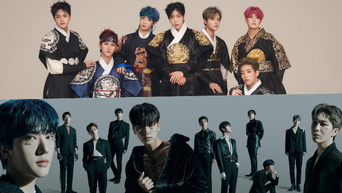Did you ever want to know what it was like to be one of the people who helped produce a new song for your ultimate bias or group? Or is there already a producer’s style that you like? And is there a producer that creates most of the hit songs your favorite group has? These are the feelings we want you to keep in mind as you read this article. We hope you enjoy exploring the world of being a producer in the K-Pop industry.
The Music Production Process
Most K-Pop songs are not produced by a singular person. In most cases, they are made through the effort of multiple individuals. An example of this would be Girls’ Generation’s ‘I Got a Boy’ because it has a credit of 36 songwriters and 15 producers from around the world. In the K-Pop industry, it is common to work with producers worldwide to add a new style and flavor to K-Pop music. Lastly, many Korean entertainment agencies don’t hesitate to collaborate with producers from a wide variety of backgrounds, whether new to producing or an expert.
Joining the K-Pop Music Industry as a Foreign Producer
Many people around the world have wanted to become a producer in the K-Pop industry due to the rise of K-Pop internationally even though at times it may seem impossible as a foreigner. But many Korean entertainment companies will discuss with foreign publishers to be able to work with producers from around the world. And through this collaboration, K-Pop companies can collect many producers’ demo samples to decide if they want to collaborate or not. This process can take a few months up to years to finish, as there might be a language barrier, and some producers might not speak Korean. So, Korean entertainment companies have to translate and tinker with the lyrics to fit the Korean language. Also, an advantage that a music producer could have when wanting to work in the Korean music industry and with Korean music producers is learning Korean so that the work they produce is already in a form that is compatible with the Korean language. Lastly, while the process of writing a song in Korean is usually learned through hands-on experience, this advice can be found online as well from other producers who have worked in the Korean music industry like AZODI, a UK-based music producer.In the video below AZODI discusses what makes a K-Pop song’s production special. He builds a sample of a standard K-Pop track and talks about tips on how to create a K-Pop song. As well as what is favored in K-pop music when it’s being produced.
Online Collaborations with K-Pop Producers
It has become easier to collaborate with K-Pop producers online and the K-Tune platform helps music producers to do just that. This website focuses particularly on K-Pop and links music producers from all around the world with Korean music producers. Also, K-Tune helps with issues such as language barriers and location boundaries getting in the way of potential collaborations. And if you’re wondering how this all works? The process for this platform is that the producer of the track picks who they want to collaborate with out of the responses submitted and the two teams then get together and work out how they want to continue in creating the song. Lastly, it is important to note as well that K-Tune was formed through the expertise of top Korean producers, topliners, lyricists, and audio engineers.
Tips and Quotes from Music Producers in the K-Pop Industry
“One of the greatest strengths of K-Pop is its performance and I think it should not be overlooked in K-Pop production.”“I think there should be a dynamic flow as much as possible.”- Kei Lim, Devine Channel (one half of the production duo) “The chemistry between us is like a four-tier filter. Having other people that you trust and respect… It just helps to drive where that track is going."- Jeremy Reeves, The Stereotypes“A lot of different things that we all have different strengths in is that as a collective it’s bigger than just making beats and being producers.”- Ray Romulus, The Stereotypes
Interviews That Expand on Being a Producer in the K-Pop Industry
Adrian McKinnon on his musical background, songwriting process, writing for EXO, SHINee, NCT, and more
Adrian McKinnon on K-Pop harmonies, line distribution, working with SHINee’s JongHyun, and more
SAARA on How She Became A Platinum-Selling K-Pop Songwriter
Fans Debate The Standing Of Non-Asian Idols In The K-Pop Industry: The Who, Why, Where, And How FANBUZZ|Jul 4, 2022 How K-Pop Marketing Trends Have Changed Over The Years Using Boy Groups As A Case Study FANBUZZ|Jun 8, 2022 Fans Debate Whether Alternate Universes And Lore Are An Essential Part Of K-Pop Group Concepts FANBUZZ|May 27, 2022



